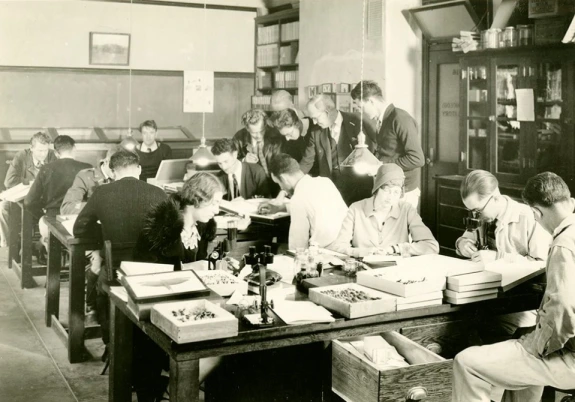
About
Founded in agriculture, rooted in life.
We are a key part of the College of Agriculture, Life and Environmental Sciences, with a century-long history of advancing knowledge on insect biology, integrated pest management, education and outreach.
The University of Arizona's Department of Entomology is internationally renowned for its excellence in research, teaching, and outreach. Located in Tucson, Arizona, amid the biodiversity of the Sonoran Desert—one of the world’s most diverse insect habitats—the department is equipped with state-of-the-art research facilities both on campus and throughout the state.
Faculty members are affiliated with several specialized centers, including the Carl Hayden Honeybee Lab and the Arid-Land Agricultural Research Center. The department is highly ranked, with top-ten placements in faculty citation, award, and grant metrics, making it one of the best programs in the world.
The university also offers a Graduate Interdisciplinary Program in Entomology and Insect Science, which allows students to tailor their studies with guidance from experts across various disciplines such as ecology, molecular and cellular biology, plant sciences, and neurobiology.
The Department of Entomology is also committed to community engagement through programs like the annual Arizona Insect Festival, where thousands of visitors learn about insects and their ecological importance. The Insect Discovery Outreach Program further connects with local schools, reaching over 16,000 students and promoting scientific curiosity. The University of Arizona Insect Collection, one of the largest in the region, houses nearly 2 million specimens and serves as an important resource for research and education. Additionally, the department offers a Visiting Arthropod Systematist Program, providing annual awards to support research in arthropod systematics.
Read our 2023 Department of Entomology Academic Program Review Self-Study Report and Appendices.

Our history
Entomology has been a cornerstone of the University of Arizona since its founding, recognizing the vital role pest management plays in the state's agricultural success. From the beginning, our university’s founders understood the importance of managing pests to support the state's burgeoning agricultural economy, appointing an entomologist as one of the first hires at the Arizona Experiment Station. Research into native biodiversity and agricultural pests began in the early 1900s, with entomology courses first offered in 1917.
In the early days, our efforts focused on combating pests such as aphids, bollworms, scale insects, and grasshoppers that threatened vital food and fiber crops. Under the leadership of Charles T. Vorhies, a pioneering department head, our faculty emphasized collaboration across disciplines. Vorhies fostered strong connections between entomologists, botanists, ornithologists, and ecologists to deepen our understanding of Arizona’s unique environments.
As the mid-20th century ushered in the widespread use of synthetic insecticides like DDT, our researchers worked closely with the U.S. Department of Agriculture to assess their impact on human and environmental health. Early warnings about the detrimental effects on bees and pollinators led to the development of alternative pest control methods. This commitment to innovative pest management strategies paved the way for Integrated Pest Management (IPM) programs, blending cultural, biological, physical, mechanical, and chemical approaches to control pest populations.
Celebrating Arizona’s rich and diverse insect populations, our entomologists have contributed to one of the most comprehensive insect collections in the region. Over the past century, the University of Arizona has remained at the forefront of entomology research, shaping sustainable pest management practices and biodiversity conservation that continue to protect Arizona’s agriculture, environments, and people.
